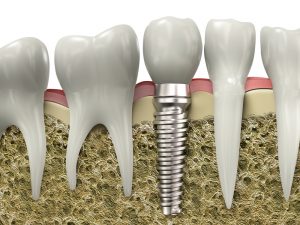 If you’ve lost a tooth, you should be thinking about replacing it with a prosthetic. Leaving a gap open can change the way the rest of your teeth fit together, and not in a good way. When your alignment changes due to a lost tooth, it can make your bite less effective and make your teeth more vulnerable to cracking and erosion. The bottom line is that patients who lose a tooth and do not have it replaced are more likely to lose more teeth in the future. Replacing the tooth can help you prevent that risk.
If you’ve lost a tooth, you should be thinking about replacing it with a prosthetic. Leaving a gap open can change the way the rest of your teeth fit together, and not in a good way. When your alignment changes due to a lost tooth, it can make your bite less effective and make your teeth more vulnerable to cracking and erosion. The bottom line is that patients who lose a tooth and do not have it replaced are more likely to lose more teeth in the future. Replacing the tooth can help you prevent that risk.
In addition to the potential for structural damage to your teeth, having a gap can also contribute to a painful condition called TMJ disorder. Losing a tooth can change the way you bite and chew, which can cause dysfunction in the temporomandibular joints of the jaw. For example, imagine you lost a molar. Without that chewing surface in the back of your mouth, you might start favoring the other side of the mouth to chew. Over time, the muscles of your jaw may become imbalanced, with one side getting more use than the other. This in turn can cause stress one side of the jaw, and you might end up with overtired muscles and a jaw that doesn’t open and close properly—TMJ dysfunction. This condition can also lead to pain in the jaw and headaches. Replacing a missing tooth helps you keep your teeth and jaw joints in proper balance.
Two Options for Tooth Replacement
There are two ways to replace a missing tooth; a dental bridge or a dental implant and crown(also called a tooth implant). A dental bridge is a one-piece construction that looks like a row of three false teeth. The two teeth on the ends are actually crowns, which are attached to the healthy teeth next to your gap. A bridge gives you back the use of your lost tooth, and it stabilizes the teeth nearby, so your alignment won’t change. However, it is dependent on the health of the crowned teeth for stability. If one of those two teeth should fail or become damaged, the bridge cannot stand.
A tooth implant, on the other hand, is a freestanding construction that replaces your lost tooth without affecting other teeth. It replaces the tooth, crown and root, and creates a permanent prosthetic that may very well last a lifetime. A bridge, on the other hand, will only last about 8-10 years before needing replacement. Dental implants also prevent bone loss because they replace the tooth roots. When a tooth is lost and not replaced with an implant, the jawbone at the site of the missing tooth will slowly be reabsorbed by the body, resulting in bone loss.
Overall, a dental bridge is the fastest and least expensive option, but it is also less permanent and less helpful to your long term oral health. When properly placed and integrated into the body, dental implants become a permanent part of your body. Like a hip replacement or knee replacement, you won’t have to worry about getting it replaced in the future.
Contact Us for a Consultation
Contact Fresno Dental Studio to learn more about tooth replacement. We provide both tooth implants and bridges in our Fresno dental office. We will help you determine the best way for you to replace your lost tooth, based on your oral health factors and preferences. Call us today at 559-297-1294 for a consultation.